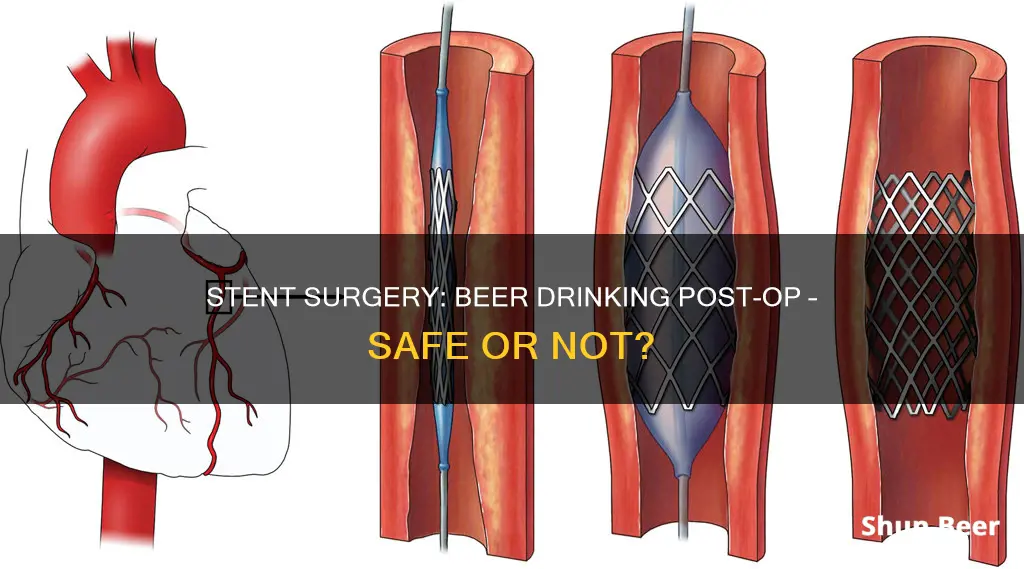
Whether you can drink beer after stent surgery depends on a number of factors. Generally, moderate alcohol consumption is considered safe and appropriate for most people with a coronary stent. However, alcohol consumption can raise blood pressure and interact with certain heart medications, so it's important to discuss this with your doctor. If you've had a heart attack, it's recommended to refrain from drinking alcohol for the first month to allow your heart to recover. Once you start drinking again, it's important to limit yourself to one drink per day to maintain heart health and avoid negative consequences. Research has shown that moderate alcohol intake can reduce the risk of coronary artery disease and restenosis in men with coronary artery disease who have undergone percutaneous transluminal coronary angioplasty (PTCA) and stent implantation.
| Characteristics | Values |
|---|---|
| Can I drink beer after stent surgery? | Generally, moderate alcohol consumption is safe and appropriate for most people with a coronary stent. However, you should discuss this with your doctor, as alcohol consumption can raise blood pressure, and alcohol can interact with certain heart medications. |
| How much alcohol can I drink? | It is recommended to limit yourself to one drink per day. |
| What type of alcohol is best? | Although red wine gets most of the praise, white wine, beer, and liquor have similar effects, probably because all boost levels of HDL ("good") cholesterol to a similar degree. |
What You'll Learn

Beer and heart health
Beer and other alcoholic drinks have been linked to a reduced risk of heart attacks, especially in men over 60 and those with other risk factors. However, this is only true for moderate consumption, as heavy drinking negatively affects the heart and circulation, as well as other organs like the liver.
The Benefits of Moderate Alcohol Consumption
Moderate alcohol consumption can boost levels of HDL ("good") cholesterol, which is beneficial for heart health. Research has shown that moderate drinkers have a lower risk of coronary artery disease and restenosis after percutaneous transluminal coronary angioplasty (PTCA) and stent implantation.
For men, moderate consumption is typically defined as one to two drinks per day. One drink is equivalent to 5 ounces of wine, 12 ounces of beer, or 1.5 ounces of liquor. Women should not exceed one drink per day.
Precautions and Recommendations
It's important to note that alcohol consumption can raise blood pressure and interact with certain heart medications. Therefore, it's crucial to discuss alcohol consumption with your doctor, especially if you have a heart condition or are taking any medications.
If you've recently had a heart attack or undergone a heart stent procedure, it's recommended to refrain from drinking alcohol for at least the first month to allow your heart to recover. Even after that, it's important to consume alcohol in moderation and not exceed the amounts discussed with your healthcare team.
While moderate beer consumption can have potential benefits for heart health, it's important to remember that excessive drinking is detrimental to overall health. Always consult with your healthcare provider to determine safe and appropriate alcohol consumption based on your individual circumstances.
Charleston Beer Works: Closest Hotels for a Quick Pint
You may want to see also

How much alcohol is safe after stent surgery?
It is generally considered safe for people to return to moderate alcohol consumption after stent surgery. However, it is important to consult with a doctor, as alcohol consumption can cause an increase in blood pressure and may interact with certain heart medications.
For men, moderate alcohol consumption is typically defined as one to two drinks per day, with one drink being equivalent to 5 ounces of wine, 12 ounces of beer, or 1.5 ounces of liquor. Women are advised to limit themselves to one drink per day.
In a retrospective cohort study, researchers examined the effects of alcohol intake on 225 men who had undergone percutaneous transluminal coronary angioplasty (PTCA) and stent implantation. The results showed that men who consumed between 50 and 700 grams of alcohol per week had a significantly lower risk of coronary restenosis and repeat angioplasty compared to those who drank less than 50 grams per week.
It is recommended that individuals who have undergone stent surgery refrain from drinking alcohol for the first month after the procedure to allow their heart to recover. Additionally, it is important to note that heavy drinking can negatively impact the heart, liver, and other organs. Therefore, it is crucial to drink in moderation and always consult with a healthcare professional for personalized advice.
Drinking Beer in Your Car: Driveway Legalities Explained
You may want to see also

Alcohol's impact on blood pressure
Alcohol can have a significant impact on blood pressure. While moderate alcohol consumption may lower the risk of coronary artery disease, excessive drinking can lead to raised blood pressure and hypertension.
Drinking too much alcohol can cause the muscles in your blood vessels to narrow, which in turn makes the heart work harder to pump blood around your body, increasing blood pressure. The more alcohol you drink, the higher the risk of developing hypertension.
In addition, binge drinking and long-term heavy drinking can lead to strokes, as well as weakening the heart muscle, a condition known as cardiomyopathy. Alcohol can also cause an irregular heartbeat, or arrhythmia.
According to the American Heart Association, the recommended alcohol intake is no more than two drinks per day for men and one drink per day for women.
Beer and Breakouts: Is Your Skin at Risk?
You may want to see also

Interaction of alcohol with heart medication
It is important to note that alcohol often has harmful interactions with prescription medications, over-the-counter drugs, and even some herbal remedies. Alcohol can change the effects of many blood pressure or heart medicines, so it is always best to ask your doctor or pharmacist about potential interactions.
Changes in Blood Pressure
When mixed with certain blood pressure medications, such as vasodilators and alpha-blockers, alcohol can cause orthostatic hypotension, which is low blood pressure when you stand up from a sitting or lying down position. This may lead to dizziness, lightheadedness, or fainting. These effects can be more severe when starting treatment or increasing your dosage.
Additionally, alcohol itself may lower blood pressure due to vasodilation (blood vessel dilation), resulting in side effects like dizziness, a fast heart rate, lightheadedness, drowsiness, fainting, or a dangerous fall. Mixing alcohol with a drug that has similar side effects can exacerbate these symptoms.
Liver Enzymes and Drug Levels
Liver enzymes play a crucial role in how medications are processed in the body before they are excreted. Alcohol can interfere with these liver enzymes and alter drug levels in the bloodstream, potentially worsening side effects or reducing the effectiveness of the medication. If you have liver disease or a history of liver problems, it is crucial to inform your doctor before starting any heart or blood pressure medication.
Weight Gain and High Blood Pressure
Excessive alcohol consumption can indirectly contribute to weight gain, which, in turn, can lead to high blood pressure or heart disease. Therefore, drinking too much alcohol may counteract the intended effects of your heart medication.
Extended-Release Medications
Some heart or blood pressure medications are designed to be extended-release or sustained-release, meaning they are gradually released into the bloodstream over a more extended period. However, when combined with alcohol, some long-acting medications can release their active ingredients too quickly, leading to increased side effects.
Specific Drug Class Interactions
ACEIs or ARBs
Angiotensin-converting enzyme inhibitors (ACEIs) and angiotensin receptor blockers (ARBs) are commonly used to treat high blood pressure. Examples include lisinopril (Zestril), benazapril (Lotensin), losartan (Cozaar), and valsartan (Diovan). Combining these drugs with alcohol may result in headaches, dizziness, lightheadedness, fainting, and changes in heart rate.
Alpha-Blockers
Alpha-blockers, such as clonidine (Catapres) and doxazosin (Cardura), are used to treat high blood pressure. When mixed with alcohol, they can cause low blood pressure, lightheadedness, drowsiness, and an increased risk of falling.
Antianginal Agents (Nitrates)
Nitroglycerin and isosorbide (nitrates) are antianginal agents that help prevent chest pain or pressure from angina. When combined with alcohol, they can cause sedation and hypotension (low blood pressure).
Beta-Blockers
Beta-blockers, such as atenolol or metoprolol, may enhance the blood pressure-lowering effect when mixed with alcohol. This combination can lead to headaches, dizziness, lightheadedness, fainting, and changes in pulse or heart rate, especially when initiating treatment or adjusting the dosage.
Diuretics
Diuretics, also known as water pills, such as hydrochlorothiazide or furosemide (Lasix), can amplify the blood pressure-lowering effects when combined with alcohol, leading to headaches, dizziness, lightheadedness, fainting, and changes in pulse or heart rate.
Calcium Channel Blockers (CCBs)
Calcium channel blockers can have varying interactions with alcohol. For example, verapamil can increase blood alcohol levels and enhance the intoxicating effect. It can also make it harder for your body to eliminate alcohol, potentially worsening side effects like drowsiness, confusion, nausea, or feeling "drunk." Amlodipine (Norvasc) may have additive effects in lowering blood pressure, resulting in similar side effects.
It is crucial to consult your doctor or pharmacist before consuming alcohol with any heart or blood pressure medication. They can provide specific guidance based on your individual health status and the medications you are taking.
Beer Drinking in Minnesota State Parks: What's Allowed?
You may want to see also

Recommended recovery timeline after stent surgery
The recovery timeline after stent surgery can vary from person to person, but there are some general guidelines to follow. Here is a recommended recovery timeline:
Day of surgery
If your stent surgery was planned (non-emergency), you'll likely be able to leave the hospital on the same day or the following day. Make sure to have someone to take you home. Before you leave the hospital, the medical team will provide advice on medication, diet, lifestyle changes, and wound care. They may also schedule a follow-up appointment to check on your progress.
First week
During the first week after stent surgery, it is important to take it easy and rest. You should be able to get up and walk around, but avoid strenuous activities and heavy lifting. Keep your incision site clean and avoid soaking in a bath or hot tub, as this can slow wound healing. You may experience some soreness, tenderness, or bruising around the incision site, which is normal and should improve over time.
First two weeks
Avoid driving for the first two weeks after stent surgery, especially if you are still experiencing chest pain or other symptoms. If you had a heart attack and received a stent, it is recommended to wait at least two weeks before flying.
First month
Continue to follow your doctor's instructions and take any prescribed medications. You may gradually increase your physical activity, but it is important to listen to your body and not overexert yourself.
Long-term recovery
Even after the initial recovery period, it is important to maintain a heart-healthy lifestyle. This includes eating a healthy diet, staying hydrated, exercising regularly, and managing stress. Most people need to take blood-thinning medications for up to a year after stent surgery, and some may need to continue taking low-dose aspirin long-term.
Beer and Vitamin D2: What's the Verdict?
You may want to see also
Frequently asked questions
Generally, moderate alcohol consumption is considered safe and appropriate for most people with a coronary stent. However, it is important to discuss alcohol consumption with your doctor, as it can raise blood pressure and interact with certain heart medications.
It is important to consume alcohol in amounts that do not exceed what you and your healthcare team have considered acceptable. For men, the best "dose" is typically one to two drinks per day, with one drink being equivalent to 12 ounces of beer. Women are advised to limit themselves to one drink per day.
If you typically drink alcohol every day, it is recommended to refrain from drinking for the first month after stent surgery to allow your heart to recover.
Alcohol intake can reduce the risk of coronary artery disease and restenosis after stent surgery. It can also increase levels of HDL ("good") cholesterol.
Heavy drinking can negatively impact the heart, liver, and other organs. Alcohol consumption can also raise blood pressure and interact with certain heart medications. Therefore, it is important to discuss alcohol consumption with your doctor to ensure it is safe and does not interfere with your medication.







